
 |
|
The United States Of Leland (2004) Cast: Ryan Gosling, Don Cheadle, Jena Malone, Chris Klein, Michelle Williams, Kevin Spacey, Lena Olin, Martin Donovan, Ann Magnuson, Sherilyn Fenn, Kerry Washington, Michael Welch, Matt Malloy, Wesley Jonathan, Michael Pena, Alec Medlock, Ryan Malgarini, Angela Paton, Ron Canada, Troy Winbush, Nick Kokich, Yolonda Ross 2004 – 108 minutes Rated: Reviewed by Dustin Putman, April 3, 2004. 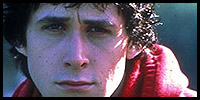 When senseless murders are committed, particularly by teenagers, the media and general public are always quick to put the blame on any number of things, from parental neglect to the influence of violent television, movies, and music. The question of why such terrible things occur is at the forefront of society's mind because it allows us to cope with the tragedy, to somehow tag an easy reason to the crime. But, sometimes, a motive for murder is not so simple as this. Just as life is complicated, multifaceted, and occasionally baffling, so are crimes. This provocative notion is at the forefront of "The United States of Leland," a shattering glimpse of the way a community reacts when the erratic killing of an innocent suddenly hits close to home.
When senseless murders are committed, particularly by teenagers, the media and general public are always quick to put the blame on any number of things, from parental neglect to the influence of violent television, movies, and music. The question of why such terrible things occur is at the forefront of society's mind because it allows us to cope with the tragedy, to somehow tag an easy reason to the crime. But, sometimes, a motive for murder is not so simple as this. Just as life is complicated, multifaceted, and occasionally baffling, so are crimes. This provocative notion is at the forefront of "The United States of Leland," a shattering glimpse of the way a community reacts when the erratic killing of an innocent suddenly hits close to home.
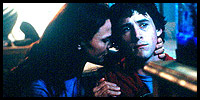 As the film begins, 16-year-old Leland P. Fitzgerald (Ryan Gosling) stabs to death Ryan Pollard (Michael Welch), a young autistic boy, deeply cuts his own hand afterward to understand what it feels like, and then returns to the safety of his bedroom. When his divorced mother, Marybeth (Lena Olin), walks in and sees his hand bandaged up, Leland can only tell her, "I think I made a mistake." Leland knows what he did, even though he has no palpable memory of it, and is promptly arrested, his face plastered all over the papers and news.
As the film begins, 16-year-old Leland P. Fitzgerald (Ryan Gosling) stabs to death Ryan Pollard (Michael Welch), a young autistic boy, deeply cuts his own hand afterward to understand what it feels like, and then returns to the safety of his bedroom. When his divorced mother, Marybeth (Lena Olin), walks in and sees his hand bandaged up, Leland can only tell her, "I think I made a mistake." Leland knows what he did, even though he has no palpable memory of it, and is promptly arrested, his face plastered all over the papers and news.
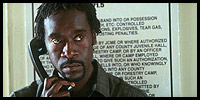 In a juvenile detention center, he is befriended by prison teacher Pearl Madison (Don Cheadle), an aspiring writer who senses Leland is unlike the other convicted kids and wants to write a book about him. As Pearl attempts to pick Leland's brain, he becomes fascinated with this young man who has the ability to come off as both remarkably compassionate and severely detached all at once. Many people seem to believe the murder of Ryan was a way to get back at big sister, Becky (Jena Malone), Leland's ex-girlfriend who suddenly dumped him for a seedy drug dealer, but Leland insists that isn't why.
In a juvenile detention center, he is befriended by prison teacher Pearl Madison (Don Cheadle), an aspiring writer who senses Leland is unlike the other convicted kids and wants to write a book about him. As Pearl attempts to pick Leland's brain, he becomes fascinated with this young man who has the ability to come off as both remarkably compassionate and severely detached all at once. Many people seem to believe the murder of Ryan was a way to get back at big sister, Becky (Jena Malone), Leland's ex-girlfriend who suddenly dumped him for a seedy drug dealer, but Leland insists that isn't why.
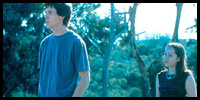 Meanwhile, the entire Pollard family is caught in a whirlwind of grief, anger, and public attention so strong that everyone else connected to them is also affected. While father Harry (Martin Donovan) flirts with the fantasy of assassinating Leland, mother Karen (Ann Magnuson) is stuck in a state of paralysis and shock. Becky, filled with regret, blames herself not only because she was in a relationship with Leland but because she was getting high at the moment of her brother's death when she should have been watching him. Becky's older sister, Julie (Michelle Williams), a high school senior planning to go away to college with longtime boyfriend Allen (Chris Klein), who lives with the Pollard's, begins to reexamine her relationship with him, as well as her own future. On the other end of the spectrum, Leland's parents—mother Marybeth and estranged author father Albert (Kevin Spacey)—find themselves virtual pariahs within the Arizona community, looked upon as just as guilty as their son.
Meanwhile, the entire Pollard family is caught in a whirlwind of grief, anger, and public attention so strong that everyone else connected to them is also affected. While father Harry (Martin Donovan) flirts with the fantasy of assassinating Leland, mother Karen (Ann Magnuson) is stuck in a state of paralysis and shock. Becky, filled with regret, blames herself not only because she was in a relationship with Leland but because she was getting high at the moment of her brother's death when she should have been watching him. Becky's older sister, Julie (Michelle Williams), a high school senior planning to go away to college with longtime boyfriend Allen (Chris Klein), who lives with the Pollard's, begins to reexamine her relationship with him, as well as her own future. On the other end of the spectrum, Leland's parents—mother Marybeth and estranged author father Albert (Kevin Spacey)—find themselves virtual pariahs within the Arizona community, looked upon as just as guilty as their son.
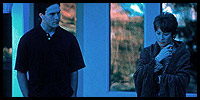 Astonishingly written and directed by Matthew Ryan Hoge (in his feature debut), "The United States of Leland" is the type of meticulously crafted, thought-provoking character drama that can only be found in the world of independent cinema. Although the film asks why Leland was driven to kill Ryan, a harmless soul who did nothing wrong, a lot of possible small reasons are offered without Hoge feeling the need to give a firm cut-and-dry explanation. That, after all, is the point of the film; Leland himself grapples with this question throughout, desperate to find a purpose for what he did when there might not have been any at all. At least, not one that could be explained with words. Sure, he was upset at Becky for breaking up with him, and even more mad that she would drop him for drugs, but he mended his heart and had already begun to move on. He and his mom were close enough, and she didn't mistreat him, while his father was out of the picture and Leland seemingly didn't mind it that way. And Leland certainly had no qualms with Ryan; if anything, he had grown to like the young guy, and would diligently walk him home from school each day.
Astonishingly written and directed by Matthew Ryan Hoge (in his feature debut), "The United States of Leland" is the type of meticulously crafted, thought-provoking character drama that can only be found in the world of independent cinema. Although the film asks why Leland was driven to kill Ryan, a harmless soul who did nothing wrong, a lot of possible small reasons are offered without Hoge feeling the need to give a firm cut-and-dry explanation. That, after all, is the point of the film; Leland himself grapples with this question throughout, desperate to find a purpose for what he did when there might not have been any at all. At least, not one that could be explained with words. Sure, he was upset at Becky for breaking up with him, and even more mad that she would drop him for drugs, but he mended his heart and had already begun to move on. He and his mom were close enough, and she didn't mistreat him, while his father was out of the picture and Leland seemingly didn't mind it that way. And Leland certainly had no qualms with Ryan; if anything, he had grown to like the young guy, and would diligently walk him home from school each day.
 The screenplay, also by Matthew Ryan Hoge, as well as the editing by Jeff Betancourt (2002's "The Good Girl"), are meticulous in their poetic, assuredly considered threading of the story's timeline. The film interweaves the past and present with depth and know-how, documenting the central characters' lives before the incident, while simultaneously showing how the murder transforms their attitudes, emotions, and outlook on the future in the week following. Beginning and ending with the life-altering event whose effect ricochets from one person to the next through the families, the film circles around on itself while delving more and more deeply into the internal thinking of Leland and the dynamic between the Pollard family members. It is a veritable treat to let the film work its spell on you, little by little, until the entire picture is finally clear and the central question of "why?" must be dealt with. Hoge wisely offers no easy answer, even if there is an ultimate answer of sorts, and he is unblinkingly powerful without going melodramatic in his study of human nature and the way people work, and think, and communicate with one another, and feel.
The screenplay, also by Matthew Ryan Hoge, as well as the editing by Jeff Betancourt (2002's "The Good Girl"), are meticulous in their poetic, assuredly considered threading of the story's timeline. The film interweaves the past and present with depth and know-how, documenting the central characters' lives before the incident, while simultaneously showing how the murder transforms their attitudes, emotions, and outlook on the future in the week following. Beginning and ending with the life-altering event whose effect ricochets from one person to the next through the families, the film circles around on itself while delving more and more deeply into the internal thinking of Leland and the dynamic between the Pollard family members. It is a veritable treat to let the film work its spell on you, little by little, until the entire picture is finally clear and the central question of "why?" must be dealt with. Hoge wisely offers no easy answer, even if there is an ultimate answer of sorts, and he is unblinkingly powerful without going melodramatic in his study of human nature and the way people work, and think, and communicate with one another, and feel.
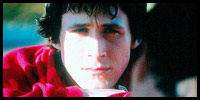 If there is a questionable conceit to be found in "The United States of Leland," it is the way Hoge likens the murder of Ryan as a "mistake," in the same way that it is a mistake when Pearl begins an affair with a pretty coworker (Kerry Washington) behind his wife's back, or it is a mistake that Albert would send Leland on two trips per year to foreign countries in place of having to spend time with his son. Where this notion gets shaky is in the easygoing comparison between the estrangement of a father or a casual love affair with the stabbing killing Leland commits. It is most certainly not on the same level, nor is murder just a part of only being human and messing up. Nonetheless, Hoge would likely agree with me, and it is doubtful that this sentiment, which passes in an out of the movie very quickly, was supposed to be taken with utmost seriousness. It was merely another idea—a way to reach the audience and get them to start thinking—and it is to Hoge's credit that he does not demonize Leland, but takes the time to step back and concentrate on the psyche of a young man who was a kind, soulful citizen before the crime. His downfall was that he viewed the world differently than others, seeing the negative in every situation and unable to find the consoling he yearned for.
If there is a questionable conceit to be found in "The United States of Leland," it is the way Hoge likens the murder of Ryan as a "mistake," in the same way that it is a mistake when Pearl begins an affair with a pretty coworker (Kerry Washington) behind his wife's back, or it is a mistake that Albert would send Leland on two trips per year to foreign countries in place of having to spend time with his son. Where this notion gets shaky is in the easygoing comparison between the estrangement of a father or a casual love affair with the stabbing killing Leland commits. It is most certainly not on the same level, nor is murder just a part of only being human and messing up. Nonetheless, Hoge would likely agree with me, and it is doubtful that this sentiment, which passes in an out of the movie very quickly, was supposed to be taken with utmost seriousness. It was merely another idea—a way to reach the audience and get them to start thinking—and it is to Hoge's credit that he does not demonize Leland, but takes the time to step back and concentrate on the psyche of a young man who was a kind, soulful citizen before the crime. His downfall was that he viewed the world differently than others, seeing the negative in every situation and unable to find the consoling he yearned for.
 From top to bottom, the cast that has been assembled for "The United States of Leland," a small film that stirred up controversy when it premiered at the 2003 Sundance Film Festival and is finally being released fourteen months later, doesn't get any better than this. Ryan Gosling is stunning as Leland, in a role that is a 180-degree turn from another murdering teenager he played in 2002's "Murder by Numbers." His part in that film was cold and calculating, while here he seems perpetually mournful, almost in a state of emotional collapse if only he could convey those very feelings to someone else. Gosling also narrates throughout, discussing small and large truths about human connections and relationships and the impulsive actions we all sometimes make, and the result is enormously touching when it might have become cloying and pretentious in a lesser film. Don Cheadle (2000's "Traffic") is very good as Pearl Madison, whose fascination with Leland rides a fine line between liking him and exploiting him for his own benefit.
From top to bottom, the cast that has been assembled for "The United States of Leland," a small film that stirred up controversy when it premiered at the 2003 Sundance Film Festival and is finally being released fourteen months later, doesn't get any better than this. Ryan Gosling is stunning as Leland, in a role that is a 180-degree turn from another murdering teenager he played in 2002's "Murder by Numbers." His part in that film was cold and calculating, while here he seems perpetually mournful, almost in a state of emotional collapse if only he could convey those very feelings to someone else. Gosling also narrates throughout, discussing small and large truths about human connections and relationships and the impulsive actions we all sometimes make, and the result is enormously touching when it might have become cloying and pretentious in a lesser film. Don Cheadle (2000's "Traffic") is very good as Pearl Madison, whose fascination with Leland rides a fine line between liking him and exploiting him for his own benefit.
 The supporting performances are just as noteworthy, with Jena Malone (2001's "Donnie Darko") further perfecting a kind of role she has been typecast in: a disaffected youth searching for solace in a world that offers her little. Chris Klein reaches for something quite darker than Oz from "American Pie" and "American Pie 2" and walks away with some of the most emotionally charged moments. His Allen is a high schooler dealt a blow with the death of his mother who now lives with the Pollard's. He believes he has his future all mapped out with girlfriend Julie, until those plans are severed and he comes to realize nothing he knew will be the same again. As Julie, Michelle Williams (2003's "The Station Agent") is quietly devastating, a happy-go-lucky girl who recoils into fear and self-desolation until her choice to break up with Allen unknowingly causes yet another tragic crime, and not the one you might expect. Rounding out the cast, each one given their moment to shine, allowing us to understand and care about their characters, Lena Olin (2003's "Hollywood Homicide") and Kevin Spacey (2003's "The Life of David Gale"), who also produced with his company, Trigger Street, are Leland's parents; Martin Donovan (2002's "Insomnia") and Ann Magnuson (2002's "Panic Room") play the Pollard parents; and the vastly underrated Sherilyn Fenn (1998's "Outside Ozona") gets an unforgettable late scene as the warm Mrs. Calderon, a New Yorker whom Leland befriended as a child who, years later, he finds is now a devastated divorcee.
The supporting performances are just as noteworthy, with Jena Malone (2001's "Donnie Darko") further perfecting a kind of role she has been typecast in: a disaffected youth searching for solace in a world that offers her little. Chris Klein reaches for something quite darker than Oz from "American Pie" and "American Pie 2" and walks away with some of the most emotionally charged moments. His Allen is a high schooler dealt a blow with the death of his mother who now lives with the Pollard's. He believes he has his future all mapped out with girlfriend Julie, until those plans are severed and he comes to realize nothing he knew will be the same again. As Julie, Michelle Williams (2003's "The Station Agent") is quietly devastating, a happy-go-lucky girl who recoils into fear and self-desolation until her choice to break up with Allen unknowingly causes yet another tragic crime, and not the one you might expect. Rounding out the cast, each one given their moment to shine, allowing us to understand and care about their characters, Lena Olin (2003's "Hollywood Homicide") and Kevin Spacey (2003's "The Life of David Gale"), who also produced with his company, Trigger Street, are Leland's parents; Martin Donovan (2002's "Insomnia") and Ann Magnuson (2002's "Panic Room") play the Pollard parents; and the vastly underrated Sherilyn Fenn (1998's "Outside Ozona") gets an unforgettable late scene as the warm Mrs. Calderon, a New Yorker whom Leland befriended as a child who, years later, he finds is now a devastated divorcee.
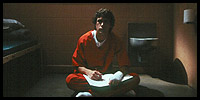 With "The United States of Leland," writer-director Matthew Ryan Hoge has crafted a remarkable first feature, and the level of talent he found to work in front of the camera proves his depth and talent in bringing this touchy subject to the screen. Touchy as it is, though, Hoge remains fair and open-minded, find basic truths in the small things in life while seeking out the key questions that need to be asked when a tragedy occurs without warning or motive. Had the Pollard family been shown interacting more often with Ryan before his death, the emotion of the situation could have resounded even more deeply because the viewer would more precisely know just what it is that they lost. As is, we are asked to fill in the blanks, an audience demand that pays off with the levels of depth and subtlety found on the anguished faces of the characters. Telling, too, that the most seemingly unbreakable bond in the film—that between Leland and Ryan—ultimately ends with Leland taking Ryan's life, changing everyone else's in the process. "The United States of Leland" is an unforgettable motion picture, lyrical in its cumulative beauty, understandable in its lack of solid answers, and heartbreaking in the clarity with which director Matthew Ryan Hoge finds in every moment. It deservedly stands as one of the very best films of 2004, thus far.
With "The United States of Leland," writer-director Matthew Ryan Hoge has crafted a remarkable first feature, and the level of talent he found to work in front of the camera proves his depth and talent in bringing this touchy subject to the screen. Touchy as it is, though, Hoge remains fair and open-minded, find basic truths in the small things in life while seeking out the key questions that need to be asked when a tragedy occurs without warning or motive. Had the Pollard family been shown interacting more often with Ryan before his death, the emotion of the situation could have resounded even more deeply because the viewer would more precisely know just what it is that they lost. As is, we are asked to fill in the blanks, an audience demand that pays off with the levels of depth and subtlety found on the anguished faces of the characters. Telling, too, that the most seemingly unbreakable bond in the film—that between Leland and Ryan—ultimately ends with Leland taking Ryan's life, changing everyone else's in the process. "The United States of Leland" is an unforgettable motion picture, lyrical in its cumulative beauty, understandable in its lack of solid answers, and heartbreaking in the clarity with which director Matthew Ryan Hoge finds in every moment. It deservedly stands as one of the very best films of 2004, thus far.
|
© 2004 by Dustin Putman |














